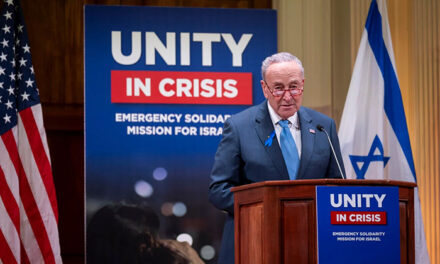Palestinians rally in support of terrorism at the Temple Mount in the Old City of Jerusalem, Jan. 27, 2023. Photo courtesy of Jamal Awad/Flash90.
Muslim worshippers can enter the Temple Mount “similar to the numbers in previous years” during the first week of Ramadan, according to Israeli Prime Minister Benjamin Netanyahu’s office.
Upholding Freedom of Worship
Netanyahu made the announcement about the Muslim holy month, which begins on Sunday evening, March 10, after meeting with security officials. After the first week, Israel will reassess and a “decision will be made accordingly,” Netanyahu’s office stated.
“Israel strongly safeguards freedom of worship for all faiths, at all sites in Israel, especially the Temple Mount,” per the office’s statement. “Ramadan is sacred to Muslims. Its sanctity will be upheld this year, as it is every year.”
In the past, Jerusalem has permitted Palestinians and Israeli Arabs to visit the Temple Mount during Ramadan, and security brass supports maintaining that policy amid the war with Hamas in Gaza.
Some 50,000 to 60,000 worshipers, including Palestinians from Judea and Samaria, are expected to enter the site.
Ben–Gvir Not Happy
The statement confirmed a Feb. 28 Channel 12 News report that Israel would only impose restrictions on individuals, citing Israel Security Agency (Shin Bet) intelligence. Channel 12 reported that the War Cabinet decided it would be the sole body making decisions about the flashpoint site, sidelining National Security Minister Itamar Ben-Gvir, who oversees the police.
The Cabinet decision came shortly after Ben-Gvir called for Palestinians in Judea and Samaria to be barred from the Temple Mount during the Muslim holy month. Ben-Gvir also pushed to ban Arab Israelis under the age of 70 from accessing the site, local media reported on Feb. 17.
At large Muslim gatherings on the Temple Mount, especially during Islamic holidays, individuals have often hoisted Hamas flags.
Ben-Gvir has warned that the Cabinet’s decision could “endanger the citizens of Israel and allow a victory photo for Hamas.”
“The decision to allow an ascent to the Temple Mount during Ramadan, similar to previous years, contrary to the police’s and my position, shows that Prime Minister Netanyahu and the small Cabinet believe that nothing happened on Oct. 7,” Ben-Gvir stated.
The minister posted on social media, “Hamas celebrations on the Temple Mount ≠ complete victory.”
The Islamist Ra’am Party welcomed what it called a “responsible decision to allow freedom of worship for Muslim worshipers at Al-Aqsa Mosque.” Party leader Mansour Abbas called on Muslim Israelis to “uphold the law and public order.”
Hamas urges Ramadan Attacks
Late in February, Ismail Haniyeh, the Doha-based leader of Hamas’s political bureau, urged the Iran-led “axis of resistance” to step up attacks on Israel during Ramadan, calling for a “broad and international movement to break the siege on Al-Aqsa Mosque.” The “axis” includes Hamas, Hezbollah, Islamic Jihad, the Houthis and other Iranian-backed terrorist groups in the Middle East. In his speech, the terror leader called on Palestinians in Jerusalem, Judea and Samaria to storm Temple Mount on the first day of Ramadan.
Haniyeh’s comments came a day after Israeli Defense Minister Yoav Gallant warned that terrorist groups are plotting to step up violent attacks on the Jewish state during Ramadan.
“The main goal of Hamas is to take Ramadan, with an emphasis on the Temple Mount and Jerusalem, and turn it into the second phase of their plan that began on Oct. 7,” Gallant told troops at IDF Central Command, which is responsible for Judea and Samaria. “This is the main goal of Hamas, and it is being amplified by Iran and Hezbollah.”
“We must not give Hamas what it failed to achieve during the beginning of the war and [let it achieve] ‘unity of the battlefields,’” he added, in reference to the terrorist group’s attempts to spark a multi-front war.










